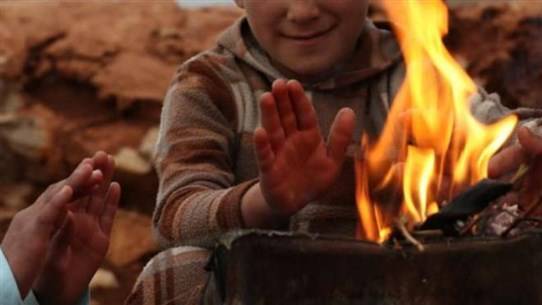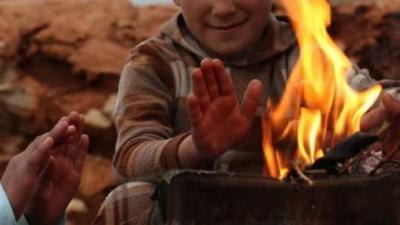The rise in fuel prices hampers the ability of many Lebanese citizens, especially those living in the central Beqaa region, to bear the cost of diesel, which consumes about two-thirds of a family's budget during the winter months. This has led many to return to using wood stoves. However, the price increase has not spared wood either, forcing the economic crisis to compel Lebanese people to substitute wood for burning by using whatever old clothes, worn-out shoes, cardboard, and tree branches they can gather from in front of their homes.
For several days, Khadr Murtada continues to cut trees from beside his home and gather branches and straw to stock up on a decent amount of fuel in preparation for the upcoming winter days. Khadr considers himself much better off than his peers, stating that many poor families do not have free access to trees. This is the case for Abu Ali, a resident of the Tamnin Al-Tahtha area in Beqaa, who complains about his inability to provide for his family's needs, saying, "How can I afford to buy wood or diesel?" The solution he has found is "storing old shoes, plastic materials, cardboard, and nylon to heat and cook with instead of wood, hoping these alternatives are gentler on my children than the state." Despite the harmful odors and gases produced from burning these materials, causing many illnesses, he says, "Dying from illness is better than dying from the cold." He confirms that he is not an exception: "Most residents in the area find these means to be an effective substitute for wood for heating."
Ismail Yazbek makes a simple comparison between a ton of wood priced at $150 and a barrel of diesel costing over $220, indicating that this amount barely meets families' needs for only twenty days during the severe winters the region has experienced in recent years. The cost of using kerosene, electricity, and gas heaters is also high, with the price of a gas cylinder estimated at 500,000 Lebanese pounds, which lasts for only 15 days and is only used in one room of the house. Therefore, Yazbek resorts to packing old shoes, worn clothes, and dried tree leaves to use as fuel for the heater during cold winter days. Second-hand clothing shops serve as a good source of fuel, as families rush to purchase whatever they can at cheap prices, destined for the wood stove.
Abu Ahmad Samaha, a seller of used shoes, affirms that sales activity increases relatively at the beginning of winter; however, this year has witnessed unprecedented demand for bales, as many have purchased bales or remnants of bales of tattered shoes and clothing to gather and use as heating fuel, with prices ranging from 50 to 70 thousand per kilo, especially since these clothes are not suitable for resale anyway. Shop owners resort to selling them to citizens for heating use at any price.
Fadi Al-Hallait complains about the smoke and black dust emanating from the wood stoves near his home, which causes dangerous odors and gases that harm health, calling on the owners of these stoves to replace these materials with wood and pomace, which are less harmful to health. Dr. Faisal Al-Haj, a specialist in respiratory and pulmonary diseases, clarifies that using clothes and shoes to ignite heaters is very dangerous for families' health, especially children. Many of these plastics, fabrics, and shoes are made from petroleum-derived materials, and burning them emits gases like carbon dioxide, leading to acute respiratory infections and affecting the bronchi and many respiratory diseases.




